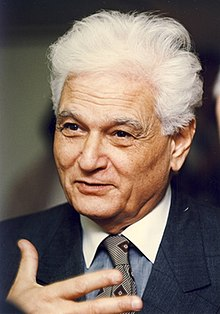Derrida and Deconstruction
About the Author:
What is Deconstruction:
"it's possible, within text, to frame a question or undo assertions made in the text, by means of elements which are in the text, which frequently would be precisely structures that play off the rhetorical against grammatical elements."
Deconstruction of a Poem:
The Soldier by Rupert Brooke
If I should die, think only this of me:That there’s some corner of a foreign fieldThat is for ever England. There shall beIn that rich earth a richer dust concealed;A dust whom England bore, shaped, made aware,Gave, once, her flowers to love, her ways to roam,A body of England’s, breathing English air,Washed by the rivers, blest by suns of home.And think, this heart, all evil shed away,A pulse in the eternal mind, no lessGives somewhere back the thoughts by England given;Her sights and sounds; dreams happy as her day;And laughter, learnt of friends; and gentleness,In hearts at peace, under an English heaven.
Rupert Brooke is a very famous poem and it has served very well as a patriotic or a nationalist poem. Here we are going to deconstruct this poem by trying to find possible biases and binary oppositions in this poem.
Bias:
"If I should die, think only this of me:That there’s some corner of a foreign fieldThat is for ever England"
Its not just this line but the whole pome is only talking about England, so we can say that the poem is England centric poem and creates many biases against nations other than England.
Binary:
A body of England’s, breathing English air,Washed by the rivers, blest by suns of home.
The words in this lines like 'body of England', English air, suns of home' might/are creating double meaning because it almost sounds as if England is having a sun of their own, and air is also different from what the rest of the world is breathing. This line are proving that one can not find meaning, we only are postponing the meaning. The language of this poem is proving Derrida's claim that is,
"Language bears within itself the necessity of its own critique".
This poem was written during World War to motivate Soldiers and recruits but its normal to assume that the soldier weren't fools to think that wherever they die it doesn't matter because they are dying for their country.







No comments:
Post a Comment